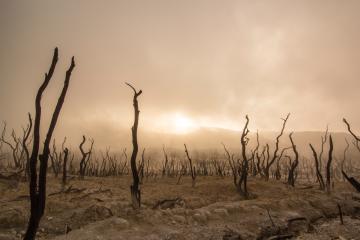
Top economists show that the decline of nature poses severe threats to continued national and global prosperity.
New research from a team of Oxford economists launched at the World Forum on Natural Capital in Edinburgh shows that Ministries of Finance and Treasuries are often blind to how dependent economies are on nature, which is declining at a dangerous rate. As a result, businesses and politicians are failing to register the systemic risk building up as the natural world fails.
Professor Cameron Hepburn, who led the research at the University of Oxford’s Institute for New Economic Thinking at the Oxford Martin School, says that flawed economic and political institutions are to blame. “Much of the value that economies create is built upon a natural foundation – the air, water, food, energy and raw materials that the planet provides. Without nature, no other value is possible.”
It’s called natural capital, and it’s the basis for all human prosperity. But because most economies fail to account for this dependency, “business as usual” is driving a dangerous trend of environmental decline.
Extreme weather, mass extinctions, falling agricultural yields, and toxic air and water are already damaging the global economy, with pollution alone costing 4.6 trillion USD every year. And we’re in danger of losing other indispensable natural capitals, like topsoil for food production or a stable climate, without which organised economies cannot function.
“We are poisoning the well from which we drink,” says Oliver Greenfield, convenor of the Green Economy Coalition, who commissioned the research. “The dire state of nature and the implications for our future, barely registers in economic decision-making. To put this another way, we are building up a big systemic risk to our economies and societies, and just like the financial crisis, most economists currently don’t see it”.
The research finds three central failings are to blame. Firstly, we currently lack the tools to adequately measure and understand the value of nature, meaning it is largely invisible to policymakers. Secondly, many economic models assume that environmental value can be easily and indefinitely replaced by man-made value; for example, the loss in natural capital from logging a forest is off-set by the creation of valuable jobs and timber – ignoring the question of what happens when the last tree is cut down. Finally, we don’t have the laws and institutions required to protect our critical stocks of natural capital from unsustainable exploitation.
Thankfully, the research finds encouraging signs that our economy can be rapidly rewired to protect the planet. Governments and businesses must start measuring their stocks of natural capital in comprehensive natural wealth accounts, and ensure that those assets are protected and improved. Better data is needed on the value of the natural wealth that underpins economic activity, so that value can be accounted for by treasuries and financial centres. And critical natural assets – without which society cannot survive – must be given special status so that they cannot be squandered.
This research is an urgent wake-up call to governments and businesses around the world: our economies are flying blind, and new models and methodologies are urgently required. “The opportunity to properly value nature is not just a task for economists but for all of us,” Oliver Greenfield added. “The societies and economies that understand their dependency on nature are healthier and more connected, with a brighter future.”
